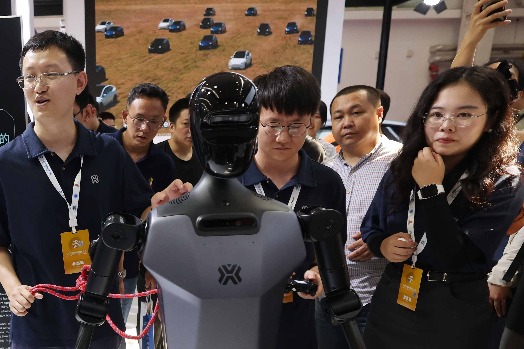Industrial internet development accelerates


China's accelerated push for the industrial internet is set to further promote the digital transformation and upgrading of traditional industries, injecting new impetus into the country's high-quality growth, officials and top business executives said.
"China's industrial internet has entered the fast lane, extending into 40 major sectors in the national economy," said Sheng Ronghua, deputy head of the Cyberspace Administration of China. "The industrial internet has played a key role in (supporting the development) of new infrastructure, providing strong driving force for China's high-quality development."
Sheng said the country should make a big push to make innovative breakthroughs in key fields such as industrial chips, industrial software and control systems, and promote the development of network identity, platform security and other core technologies.
More efforts should be made to build more industrial internet demonstration bases, gradually establish the internet infrastructure for industrial internet covering different regions and sectors and promote global cooperation on key issues such as formulating industrial internet standards and international rules, Sheng said during the 2021 World Internet Conference Wuzhen Summit, which ran from Sunday to Tuesday.
Han Xia, chief engineer of the Ministry of Industry and Information Technology, said China's industrial internet has entered a critical stage of development, adding there is a lot of room for improvement in terms of standards formulation, implementation for the industrialization of emerging technologies, the utilization of facilities and protective capabilities.
In the next step, Han said the MIIT will make a big push to spur the construction of new industrial internet infrastructure, speed up construction of the national industrial internet big data center, improve the data security level, and promote the digital transformation of small and medium-sized enterprises.
The industrial internet has been defined by the country as one among many "key industries" for the digital economy in the 14th Five-Year Plan (2021-25).
The plan called for accelerated efforts to leverage the industrial internet to drive data-enabled and coordinated transformation of entire industry chains, requiring building a number of international-level industrial internet platforms in key industries and regions during the period.
A new report from the Internet Society of China showed the scale of China's industrial internet sector reached 916.48 billion yuan ($142 billion) last year, up 10.4 percent from a year earlier.
Seeing rising growth opportunities in China's booming digital economy, Dassault Systemes, a French industrial software company that creates 3D models for multiple industries, is planning to accelerate its investment in the China market.
"China has become one of the largest contributors in terms of (our business) for Asia… representing high potential growth country and market for us," said Samson Khaou, executive vice-president of Dassault Systemes Asia-Pacific.
"China is far ahead when it comes to the digital infrastructure development, and we've been working closely with a few companies in China. We will increase and even accelerate the investment in key fields such as smart manufacturing, smart cities and smart healthcare in China."
In recent years, Dassault Systemes has been actively cooperating with local governments and enterprise customers on the digital transformation of enterprises and intelligent manufacturing to jointly create innovation centers. At present, the innovation centers have been established in big cities including Chongqing, Qingdao in Shandong province and Wuhan in Hubei province.
He Wenzhong, chief engineer of China Electronics Technology Group Corp, said the industrial internet will become a key driving force to promote the digital transformation of industries, which will help build the nation into a key manufacturing power in the world.
"We've seen deep integration of the industrial internet with digital twins, 5G, AI and other network information technologies strongly boost the industrial digitalization in China," He said. "However, the digital economy also brings new cybersecurity challenges, and more efforts are needed to deal with the new problem."




































